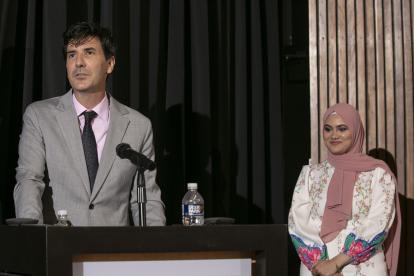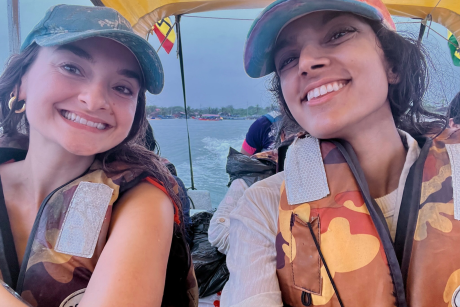Joe Egger, Ph.D., an epidemiologist who specializes in data-driven research, is the associate director for education with DGHI’s Research Design & Analysis Core, which works closely with students and faculty on data-intensive research projects. He also teaches beginning and advanced epidemiology, mentors students and occasionally acts as DGHI’s unofficial social chairman, organizing informal outings for students to get to know each other and blow off steam.
On July 1, Egger added a new title, becoming the institute’s director of graduate studies. He succeeds Nathan Thielman, M.D., in the role, which oversees DGHI’s Master of Science in Global Health program.
Egger says he thought about the new opportunity for nearly a month before accepting it. “I didn’t want to do this if I couldn’t do a good job at it or at least give it my all,” he says. “I decided it was the right thing to do based on my experiences at the institute, and my time working with students – to be able to contribute more broadly to DGHI.”
Egger spoke with us about his background in global health and how he wants to support graduate students in the new role. This interview has been condensed and edited for clarity.
Where did your interest in global health begin, and why did you want to work at DGHI?
I was motivated to pursue global health when, in 2001, I learned dengue fever affected communities in Nuevo Laredo, Mexico but had little impact on their sister community of Laredo, Texas, just across the border. This was despite both communities having the same populations of the primary dengue vector, Aedes mosquitoes. This implied social and economic inequity in Mexico, compared to the US, was causing this disproportionate burden. This led me to study the political, economic and ecological factors leading to the emergence and spread of dengue around the world.
Prior to Duke, I worked in epidemiology for the New York City Department of Health & Mental Hygiene, then I moved to Durham to lead a surveillance project for the Centers for Disease Control and Prevention as a contractor in Research Triangle Park. I had heard about DGHI before I moved down to the triangle, and I knew it was becoming one of the premier academic global health institutes in the country.
For those who don’t know, what else does the director of graduate studies do?
I serve as chair of graduate recruitment and admissions for DGHI. I also recommend changes to the MSc-GH curriculum and work with our graduate students to ensure their success in the program. I will continue to teach in the classroom but getting to know the students outside the classroom and making sure they’re prepared for careers in global health, is a priority.
Also, I help make sure faculty have the resources they need to teach classes well while overseeing experiential learning (fieldwork). A big component of our master’s degree is field-based research and making sure students have fulfilling, productive and developmentally rewarding experiences to do global health in research and practice.
Joe Egger speaks at the 2022 Master of...

This is your second director role within DGHI. How did this come about?
DGHI’s associate director for academic programs, Mary Story, Ph.D., approached me during the spring in 2022, around the time of commencement. She asked me if I was interested in the position. I’ve been here for about 10 years, and I’ve worked with students quite a bit: teaching and in my role with RDAC, I work with our graduate students on their thesis projects. I’ve worked with hundreds of graduate students. It made sense to me to get more formally involved with the curriculum and the program.
Were you surprised to be approached about the position?
A little. I wasn’t expecting it. I’m not sure I thought about doing it before, but when [Mary] asked me about it, I got excited. I decided it was the right thing to do.
What are some of the goals you want to achieve in this role?
One priority is work on decolonization of global health. It’s an area on a lot of people’s minds, including our graduate students. The field is going through a transformative phase in terms of how we view ourselves and our work, coming from a wealthy country, and how we work with our partners around the world. I’m excited about the work DGHI will be doing in this regard over the coming months.
And another one is equity. Are we teaching enough about this in our course curriculum and experiential learning? Are we teaching enough about the history of global health and colonialism, around equity and race? And how are we teaching it? In the next year, our students will see a pretty big change in how much of our focus we have on this and different opportunities available to them.
Another area is continuing to consider what we want our graduate students to be competent in when they graduate. Our competencies involve research skills, such as asking the right questions, formulating a hypothesis, and how we collect data and analyze it. Our program is already very strong in this regard, but we will review those competencies while taking into account the fact that the field of global health also has a lot of non-research career tracks, such as people who work implementing policy at government agencies and nongovernmental organizations (NGOs) that are aligned in the global health space, so how much do we build or change those competencies will be something I would like to address.
What are you wanting to take and learn from this role?
I want a better sense of the demands and mental health stressors of a graduate student, to better understand when those pressure points occur. We know that incoming students can often feel overwhelmed when they start the program and all students can be stressed during exams. Our program is rigorous so understanding when our students need extra support will help us to better serve them. I am only one person on the Education Team and our team does an amazing job to support our students, and I want to help with that in this role.
I’m also looking forward to meeting and getting to know all the students better. As a faculty member, I’ve gotten to know a lot of the students over the years, but there are students I don’t see or who aren’t in my classes. I’m excited to get to know the new students, and those returning, in this new role.



